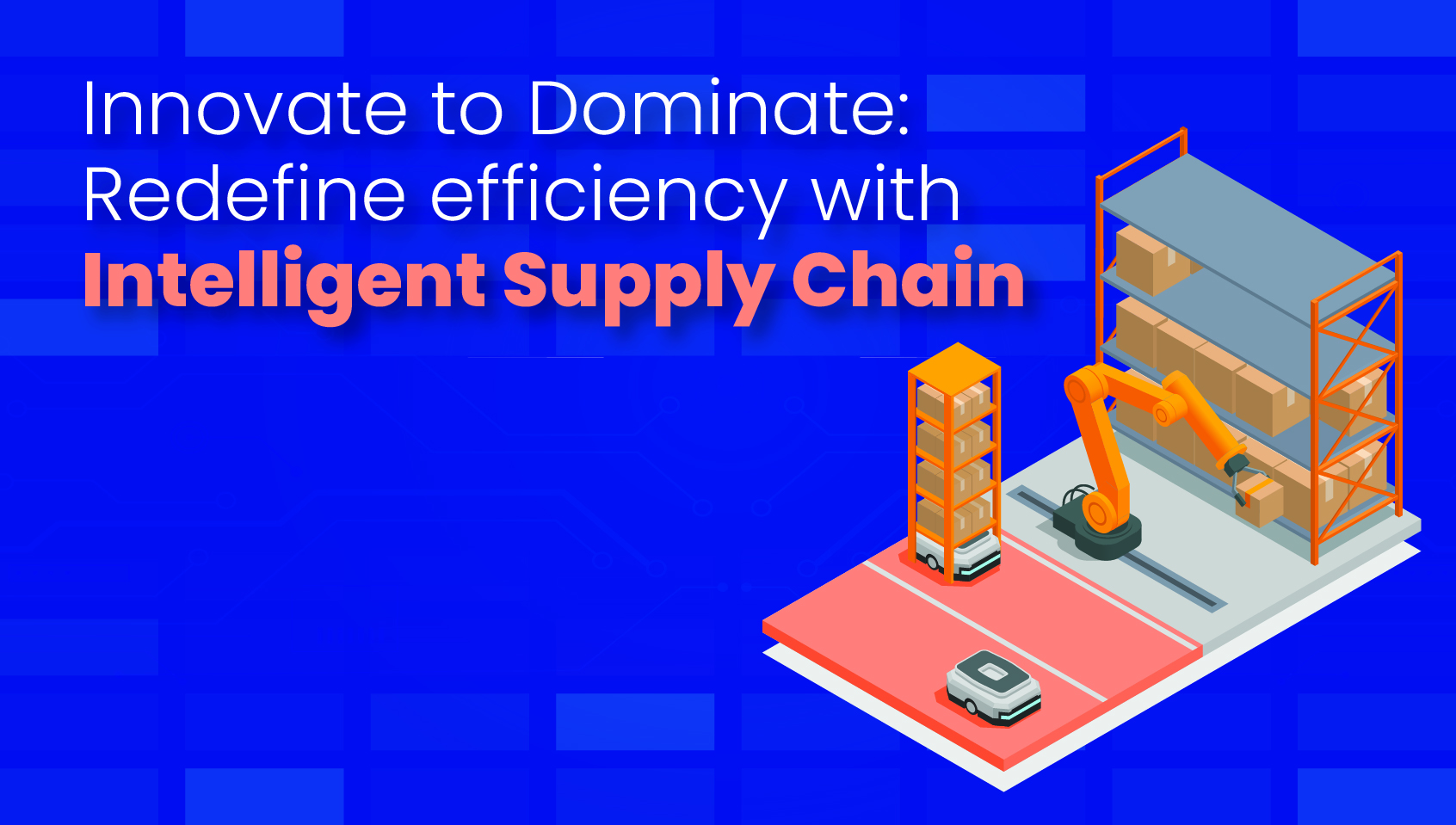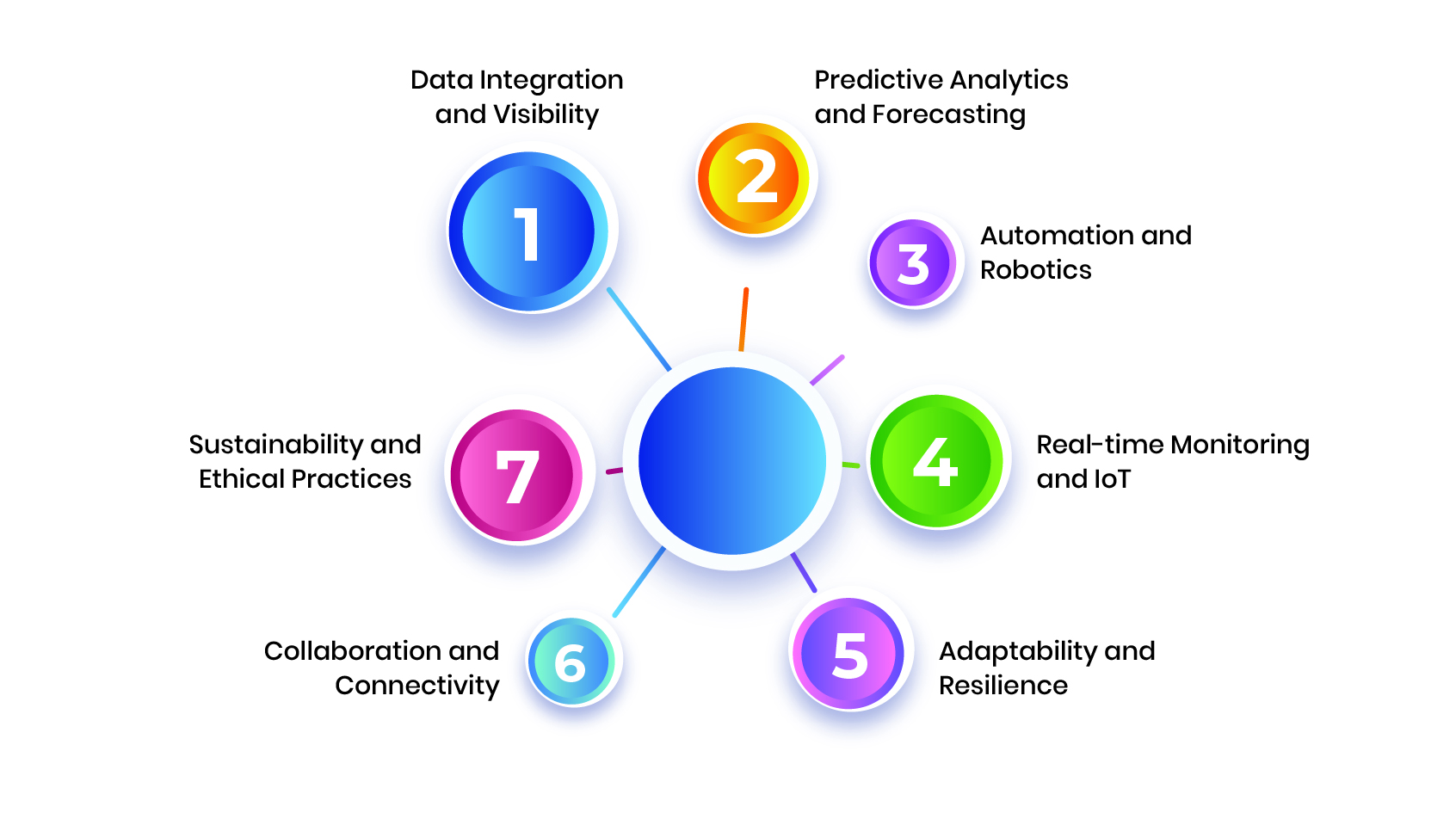
In the realm of contemporary commerce, supply chain plays a critical role in the success of businesses across various industries. But what makes an ordinary supply chain an intelligent one? Let's understand the intricacies of intelligent supply chain and explore what makes them truly remarkable.
Intelligent Supply Chain: A paradigm shift from traditional SCM
Supply chain form the backbone of modern commerce, encompassing a network of interconnected entities involved in the production, distribution, and delivery of goods and services. Before delving into the intricacies of intelligent supply chain, it's essential to understand the limitations of traditional supply chain models. One of the primary challenges faced by conventional supply chain is the lack of real-time visibility into inventory levels, transportation routes, and overall supply chain performance. This lack of visibility often leads to inefficiencies, delays, and increased costs.
Additionally, traditional supply chain is plagued by inefficient inventory management practices, resulting in excess inventory, stockouts, and obsolescence. Manual processes and human errors further exacerbate these challenges, leading to inaccuracies in forecasting, order fulfillment, and customer satisfaction.
As businesses strive to stay competitive in today's fast-paced market, the traditional approach to supply chain operations is no longer sufficient. Intelligent supply chain management represents a paradigm shift, a departure from traditional practices toward a landscape characterized by the seamless integration of cutting-edge technologies.
What makes a Supply Chain Intelligent?
To truly know what makes a supply chain intelligent, let's understand its core components:
Data Integration and Visibility
Intelligent supply chain relies on seamless integration of data from various sources and gain real-time visibility into every aspect of the supply chain. By harnessing data analytics tools and platforms, organizations can track inventory levels, monitor production processes, and anticipate market trends with unprecedented accuracy.
Predictive Analytics and Forecasting
Intelligent supply chain uses predictive analytics for demand forecasting, optimize inventory levels, and identify potential bottlenecks before they occur. By analyzing historical data and external factors, businesses can make informed decisions and proactively adjust their strategies to meet changing market dynamics.
Automation and Robotics
Automation plays a pivotal role in streamlining repetitive tasks and enhancing operational efficiency within the supply chain. From automated warehouses to robotic process automation (RPA), organizations can reduce labor costs, minimize errors, and accelerate throughput, thereby gaining a competitive edge in the market.
Real-time Monitoring and IoT
The Internet of Things (IoT) enables real-time monitoring of assets, equipment, and vehicles throughout the supply chain. By embedding sensors and connectivity solutions, companies can track the location, condition, and performance of their assets, enabling proactive maintenance and optimization of resource utilization.
Adaptability and Resilience
In this era, which is marked by unprecedented disruptions, intelligent supply chain exhibits a remarkable degree of adaptability and resilience. By embracing agile methodologies and flexible manufacturing processes, organizations can quickly respond to changing market conditions, mitigate risks, and maintain continuity in the face of adversity.

Collaboration and Connectivity
Intelligent supply chain thrives on collaboration and connectivity, forging strategic partnerships and alliances across the ecosystem. By sharing data, insights, and best practices, stakeholders can enhance transparency, foster innovation, and drive mutual growth and success.
Sustainability and Ethical Practices
In addition to efficiency and profitability, intelligent supply chain prioritizes sustainability and ethical practices. From reducing carbon emissions to ensuring fair labor practices, organizations are increasingly held accountable for their environmental and social impact, driving the adoption of eco-friendly and socially responsible supply chain strategies.
How will this shift to intelligent SC help us?
The transition to intelligent supply chain (SC) management promises transformative benefits across industries. Harnessing technologies like AI/ML and data analytics, this shift optimizes various aspects of the supply chain, leading to enhanced efficiency, agility, and resilience. By leveraging real-time data insights, businesses can make informed decisions, streamline processes, and adapt quickly to market fluctuations. Moreover, intelligent SC facilitates predictive maintenance, inventory optimization, and demand forecasting, reducing costs and minimizing disruptions. Ultimately, this paradigm shift not only enhances operational efficiency but also enhances customer satisfaction and competitive advantage in today's dynamic market landscape.
Enhanced Efficiency and Productivity
By automating routine tasks, optimizing resource allocation, and streamlining processes, ISCs significantly improve efficiency and productivity. Real-time monitoring and predictive analytics enable proactive problem-solving, reducing downtime and enhancing overall operational performance.
Improved Decision Making
ISCs empower organizations with actionable insights derived from vast amounts of real-time data. Advanced analytics tools enable better forecasting, demand planning, and risk management, allowing decision-makers to make informed choices quickly and confidently.
Cost Reduction
Through process optimization, inventory optimization, and demand forecasting, ISCs help organizations minimize waste, reduce inventory carrying costs, and optimize resource utilization. By eliminating inefficiencies and redundancies, organizations can achieve substantial cost savings.
Better Customer Satisfaction
ISCs enable organizations to meet customer demands more effectively by ensuring product availability, shorter lead times, and accurate order fulfillment. Enhanced visibility across the supply chain allows organizations to proactively address issues and provide superior customer service, leading to higher satisfaction and loyalty.
Challenges in Implementing Intelligence
While the benefits of intelligent supply chain are undeniable, it is a must to consider the challenges that may occur during the implementation of the aforementioned transformative technologies. These include data security concerns, legacy system integration, talent acquisition, and cultural resistance to change.
Challenge: Data Security and Privacy Concern
The proliferation of data in an intelligent supply chain raises concerns about data security, privacy, and compliance.
Solution: Employ robust data encryption techniques, implement access controls, conduct regular security audits, and invest in advanced threat detection systems to protect sensitive information and maintain customer trust.
Challenge: Integration with Legacy Systems
Integrating intelligent supply chain solutions with legacy systems and infrastructure can be complex and challenging.
Solution: Invest in modernization efforts and adopt agile methodologies to ensure seamless integration and compatibility with existing technologies.
Challenge: Talent Gap in Digital Skills
The adoption of intelligent supply chain requires specialized skills in data analytics, AI, and robotics. However, many organizations face a talent gap in these areas, making it difficult to recruit and retain qualified professionals.
Solution: Invest in employee training programs, collaborate with academic institutions, and leverage recruitment strategies to attract and retain top talent in data analytics, artificial intelligence, and supply chain management.
Challenge: Cultural Resistance to Change
Introducing new technologies and processes may face resistance from employees accustomed to traditional methods.
Solution: Foster a culture of innovation and continuous learning, provide comprehensive change management support, involve employees in the decision-making process, and communicate the benefits of intelligent supply chain implementation.
Efficient Intelligent Supply Chain in Practice:
Several industry leaders have successfully implemented intelligent supply chain solutions to drive business transformation and gain a competitive edge. For instance-
- Amazon Prime Air utilizes drones equipped with AI and GPS technology for efficient last-mile delivery. These drones can deliver packages weighing under 5 pounds to customers within 60 minutes, which reduced the delivery times significantly. By leveraging intelligent drones, Amazon achieves faster delivery times, lower operational costs, and improved customer satisfaction.
- Similarly, Walmart employs blockchain technology to enhance supply chain transparency, traceability, and trust among stakeholders. By implementing blockchain, Walmart can track and authenticate products throughout the supply chain, ensuring the integrity of goods and reducing the risk of counterfeit or fraudulent items. This approach increases trust among stakeholders, improves inventory management, and ultimately enhances customer satisfaction.
As the contours of commerce continue to evolve, businesses must adopt a future-forward mindset, one that embraces change as a catalyst for growth rather than a harbinger of uncertainty. By remaining agile, adaptable, and attuned to emerging trends, organizations can seize the opportunities presented by intelligent supply chain management, charting a course toward sustained success in an era defined by digital disruption.
Looking ahead, the future of the intelligent supply chain promises even greater innovation and disruption. Emerging technologies such as blockchain, 3D printing, and autonomous vehicles are poised to reshape the landscape, offering new opportunities for optimization, efficiency, and sustainability.
Conclusion:
In wrapping up our exploration of the intelligent supply chain, it’s clear that innovation is not just a choice but a necessity. By leveraging the transformative power of intelligent SCM, businesses can redefine their efficiency, enhance productivity and growth to dominate in an ever-evolving market landscape. As we embark on this journey of digital transformation, let's rem remember that change is not merely a challenge but an opportunity for growth. By embracing the intelligent supply chain, we can position ourselves to innovate, compete, and thrive in an era defined by digital disruption.
Whether you're a startup or an established enterprise, the adoption of intelligent supply chain holds immense potential to empower your business. From enhancing operational efficiency to delighting customers, the benefits are limitless. At Qentelli, we understand the complexities of modern commerce and the imperative of staying ahead of the curve. Our team stands ready to partner with you on your journey toward intelligent supply chain management, providing tailored solutions and expert guidance every step of the way.

